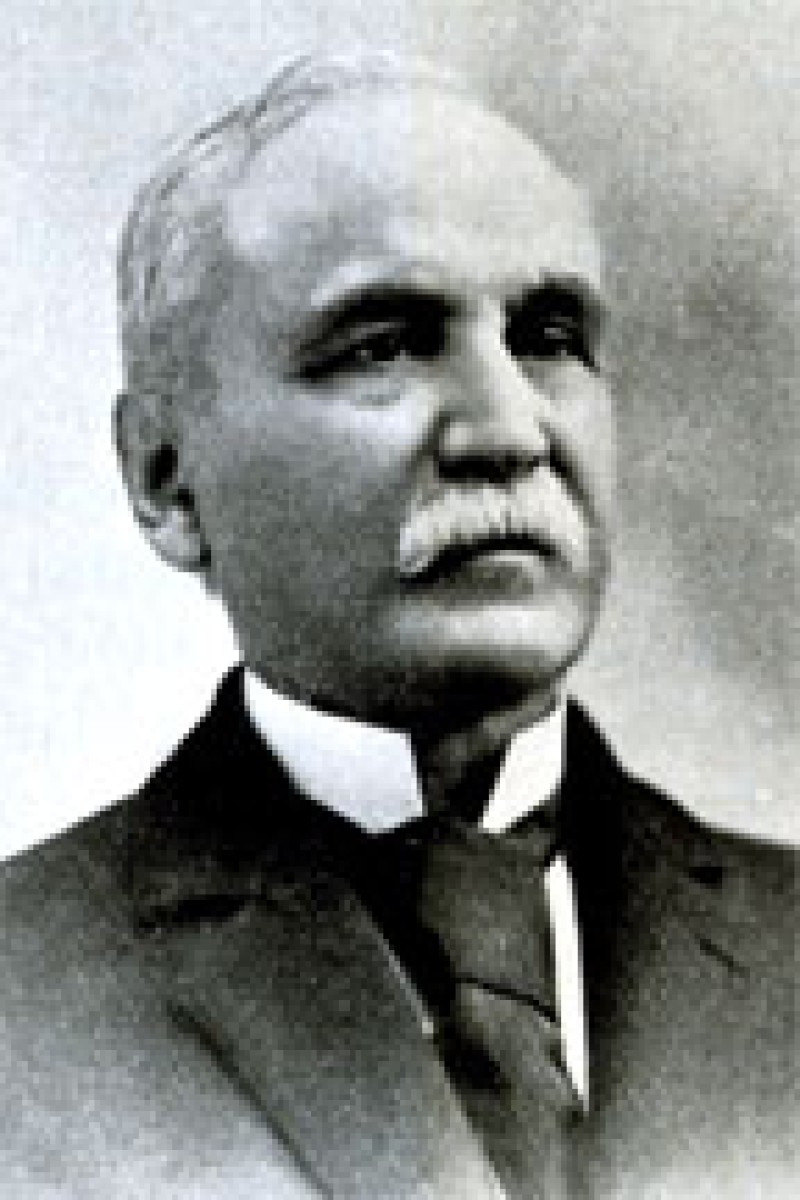Franklin Joseph Dickman
Franklin Joseph Dickman was born Aug. 22, 1828 in Petersburg, Va. to Joseph and Mary Foster Bartlett Dickman. He studied at the Petersburg Classical Institute and Brown University in Providence, R.I., where he graduated in 1846. Dickman then read law with Chief Justice Charles S. Bradley of the Rhode Island Supreme Court and Charles F. Tillinghast in their law offices. After two years of study, he was admitted to the Rhode Island bar in 1849.
In his first foray into public office in 1857, Dickman was defeated in a bid as the Democratic candidate for Rhode Island Attorney General. In 1858, President Buchanan appointed Dickman to the board of visitors of the U.S. Military Academy at West Point, N.Y. Dickman served as secretary of the board, whose responsibility was to administer annual examinations to cadets. Later in 1858, he moved to Cleveland.
During the Civil War, Dickman espoused the cause of the Union and was elected by a large majority in 1861 to represent Cuyahoga County in the Ohio House of Representatives as a Democrat. In November 1865, he and Rufus P. Spaulding founded the legal firm of Spaulding & Dickman and they practiced together until 1875. On March 25, 1867, President Andrew Johnson nominated Dickman as U.S. district attorney for the Northern District of Ohio. The U.S. Senate approved his nomination on March 28, 1867. With the election of President Ulysses S. Grant in November 1868 and knowing that President Grant wished to appoint his own people to the various government posts, Dickman resigned in March 1869.
On Feb. 15, 1883, the Supreme Court of Ohio petitioned the Ohio General Assembly to appoint a commission to help clear its backlog of undecided cases. This two-year commission had the same powers, jurisdiction and duties of the Supreme Court. Gov. Charles Foster appointed Dickman to the commission, on which he served from April 17, 1883 to its expiration on April 16, 1885. His decisions are in volumes 40 and 41 of Ohio State Reports.
Gov. Joseph B. Foraker appointed Dickman to the Supreme Court on Nov. 11, 1886 to fill the vacancy caused by the resignation of Justice William W. Johnson. Dickman won the election in November 1887 to fill the remaining two years of Johnson’s unexpired term. In November 1889, he was elected to a full five-year term. He served as Chief Justice from Feb. 9, 1894 to Feb. 9, 1895. The opinions he rendered on the Court are in volumes 45 through 52 of Ohio State Reports. He retired from the Court upon the expiration of his term on Feb. 9, 1895.
In the 1894 case State ex rep v. Jones, Auditor, a decision authored by Dickman and upheld by the U.S. Supreme Court, the Supreme Court of Ohio granted a mandamus action filed by the state board of appraisers and assessors for express, telegraph and telephone companies to compel the Lucas County auditor to distribute property taxes of The National Express Company to various cities, villages and townships inside the county. The auditor argued that the state statute granting the board the authority to assess property taxes violated the Ohio Constitution, which mandated property valuations for tax purposes be conducted under uniform rules.
Earlier in Dickman’s career, he reviewed Charles Butler’s book, Horae Juridice, in the December 1848 and February 1849 issues of The Knickerbocker magazine. Butler’s work was a series of essays examining the geography, chronology and literary history of the Grecian, Roman, Feudal, and Canon legal codes. Dickman exhorted lawyers to expand their interests beyond the confines of the legal profession. He wrote:
“The study and practice of the law without doubt are calculated somewhat to sharpen and invigorate the mind; but it may with reason be inquired whether they have an equal tendency to enlarge and liberalize it. A constant dealing in legal forms and fictions may make an accurate conveyancer or a shrewd special-pleader, but can never give one remarkable expansion or grasp of intellect. Those who are tied down all their lives to formula and detail, very rarely possess great powers of generalization; he therefore who would counteract this narrowing influence of the law must break in now and then upon the routine of professional life; must extend the sphere of his thoughts, by directing his attention to other and more literal studies. The effect of such a course will be not only to render our views more comprehensive, but to exalt the moral part of our being.”
On June 22, 1892, Brown University, his alma mater, conferred upon him the honorary degree of Doctor of Laws.
Dickman married Ann Eliza Neil on Dec. 24, 1862. They had four children. Dickman died at his home in Cleveland on Feb, 12, 1908. He is buried in Lakeview Cemetery in Cleveland.
Commenting in their memorial to the Supreme Court, Justice Dickman’s colleagues said:
“Possessed of a judicial mind, thoroughly educated in legal principles, guided by logical common sense, he not only formed right conclusions; he stated them in a style so clear, plain and well chosen that he was easily understood. Many very important and difficult questions were solved…Upon all with who he had relations, and especially his associates at the bar and on the bench, he made an enduring impression by his untiring industry, his breadth and thoroughness of scholarship, his clearness of insight, his ripeness of judgment, and above all by his high ideals of private, professional and public life. He always had an unflinching faith in the integrity of the courts, and in their ability to determine rationally all conflicting claims and interests. In all ways, his was a successful career.”

b. Aug. 22, 1828
d. Feb. 12, 1908
65th Justice of the Supreme Court of Ohio
